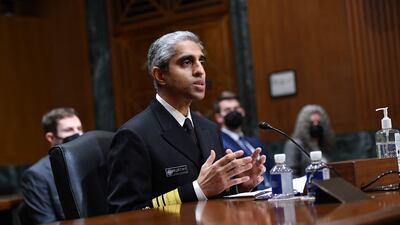US surgeon general Dr Vivek Murthy, one of the most influential presidential appointees in terms of public health guidance, has announced his desire for social media platforms to have a warning label due to increasing concern about potential effects social networks might be having on teenagers and pre-teenagers.
Dr Murthy made the call in an essay written for the New York Times, which comes amid a growing chorus of academics, parents and mental health experts voicing concern about the possible ramifications caused by social media apps.
The platforms, such as Facebook, TikTok, Instagram and Snapchat, are not new to criticism from various governments around the world, but a warning label akin to something found on cigarettes or alcohol would signal a new level of public health concern.
In the essay, Dr Murthy, appointed by US President Joe Biden, did not mince his words about what he felt was the ample research showing the potential mental health dangers faced by teenagers who spend a lot of time on social media.
"These harms are not a failure of willpower and parenting; they are the consequence of unleashing powerful technology without adequate safety measures, transparency or accountability," he wrote.
In his essay, Dr Murthy didn't stop at simply pushing for a warning label. He also told the New York Times that there should be increased cooperation between social media companies and medical researchers.
"Additionally, companies must be required to share all of their data on health effects with independent scientists and the public — currently they do not — and allow independent safety audits," he wrote.
In a previous interview on the subject, Dr Murthy also said that, in his view, the platforms were designed to make it difficult for users to simply log off and look away.
“It’s one thing to do that to an adult, and another thing to do it to a child, whose impulse control is still developing, whose brain is at a sensitive phase of development," he said.
Dr Murthy is not alone by any measure in his criticisms about the potential effects social media platforms might have on younger users.
For several months on bestseller lists in the US, American social psychologist Jonathan Haidt’s book, The Anxious Generation, which largely seeks to indict smartphones and social media for causing an increase in mental illness, has enjoyed sustained success on the charts.
In his book, Mr Haidt recommends action from parents and schools to limit smartphone access, especially among preteens.
The commotion and consternation surrounding social media and smartphone addiction has prompted a lot of debate as to how to best address potential technologically induced societal woes.
When asked about teenagers and the potential for social media and technology addiction in an interview with The National, entrepreneur and social media content guru Gary Vaynerchuk said that largely, in his view, that parenting was to blame.
“Anything not in moderation is a problem,” he said. “If you're saying being on your cell phone 15 hours a day constantly is a problem, yes, of course, it is ... be a parent and take it [smartphone] away, delete the app, moderate your child,” he said.
“I think we have a parenting pandemic,” he explained. “What I'm fascinated by is that we are in a generation of parenting that is not willing to have children face consequences and ramifications for their actions. I think that's our issue.”
Mr Vaynerchuk did explain, however, that he was not trying to absolve big technology companies completely.
“No, I fully agree,” he said. “My argument though, is that we're always talking about big tech, and we're always talking about regulation. Why aren't we talking about parenting?”
There are, however, critics of the social media platform pile-on, who point to other societal woes that may have more of an influence on teenage mental health.
All debates aside, it remains to be seen exactly how warning disclaimers or labels might be placed on social media platforms.
Any sort of label would have to likely stem from congressional legislation.
On a bi-partisan level, both Democrats and Republicans have shown their willingness to scrutinise Big Tech in recent years.
Most recently, both houses of congress passed a bill that could eventually ban TikTok in the US, but that bill is currently being litigated by TikTok's parent company, ByteDance.
Any sort of mandated mental health disclaimer would probably trigger similar litigation from social media companies.


